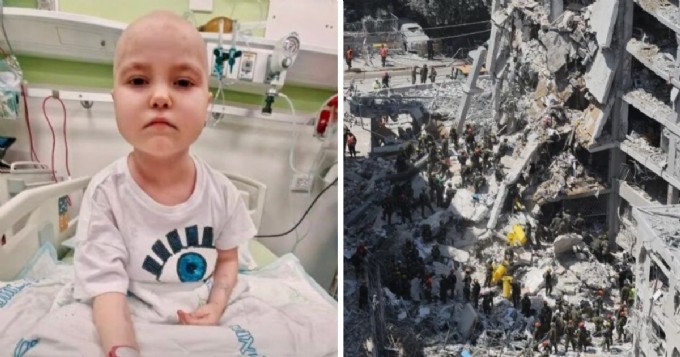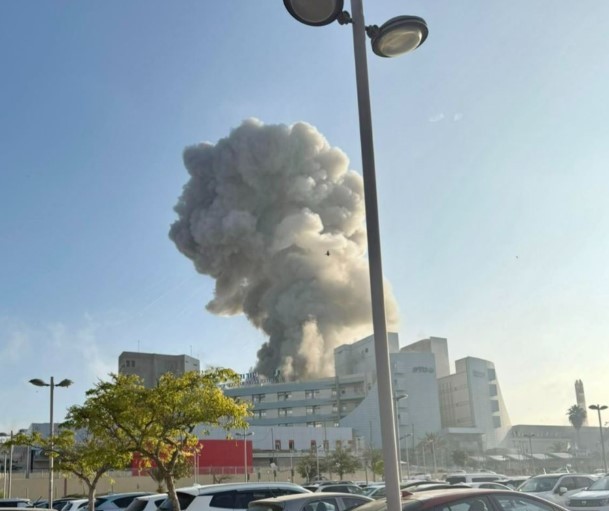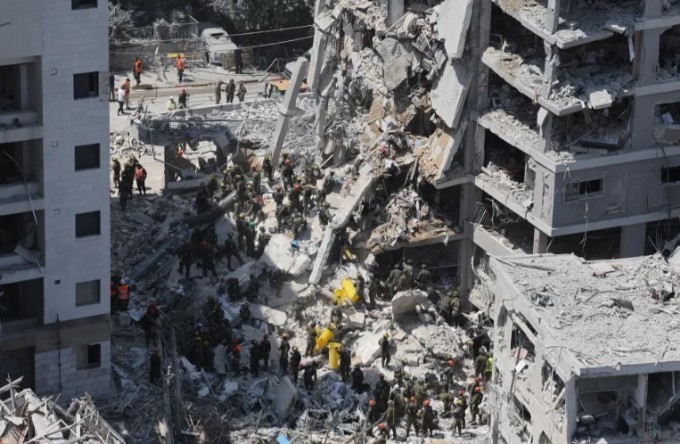Fabulous
Ukrainian Girl Killed in Iran Missile Strike on Israel
Tragic Loss: 7-Year-Old Ukrainian Cancer Survivor Killed in Iran’s Missile Attack on Israel.

A heartbreaking tragedy has struck the global community as a seven-year-old Ukrainian girl, who had fled the war in her homeland to receive life-saving leukemia treatment in Israel, was killed in an Iranian missile strike on Sunday night.
Nastia Borik, who arrived in Israel in 2022 with her family to escape the devastating Russian invasion of Ukraine, was among six civilians killed when Iranian missiles hit an apartment building in Bat Yam, a suburb of Tel Aviv.
According to The Times of Israel, the young girl died alongside her grandmother, Lena Peshkurova, 60, and two cousins—Konstantin Totvich, 9, and Ilya Peshkurov, 13. Her mother, 30-year-old Maria Peshkurova, remains missing and is feared dead or critically wounded.
The tragic incident occurred as Iran launched a barrage of ballistic missiles and drones toward Israeli cities in what has become one of the most dangerous escalations in Middle Eastern geopolitics in recent years. Over 180 people were injured in the strike, which followed nearly a week of cross-border conflict between Israel and Iran.
A Refuge Turned into a Battleground
Nastia’s family arrived in Israel hoping for a fresh start and a fighting chance against leukemia—a condition that required urgent and specialized medical attention. The girl’s father, Artem, was unable to accompany the family due to a Ukrainian government mandate preventing men under 60 from leaving the country amid the ongoing conflict with Russia.

The family settled in Bat Yam, a residential area that had, until now, remained largely out of the direct line of fire in regional conflicts. However, Iran’s latest offensive shattered that relative safety, turning a place of healing into a site of unimaginable loss.
Medical Facilities Targeted as Conflict Escalates
Latest News
The missile assault on Israel was not limited to residential areas. Soroka Medical Center in Beersheba, one of Israel’s largest hospitals, sustained severe damage after being hit by an Iranian ballistic missile. Israeli health authorities confirmed approximately 70 casualties as a result of the strike on the hospital, with several patients and staff critically injured.

In retaliation, the Israel Defense Forces (IDF) launched targeted airstrikes on Iran, including a strike on a decommissioned plutonium reactor in Arak. The IDF stated that the attack was intended to “prevent the site from being restored and used for nuclear weapons development.”
Tensions at Breaking Point: Global Implications
The missile exchange has triggered international concern, with world leaders warning of the potential for full-scale regional war. The United States has indicated it is prepared to join Israel in striking Iran’s nuclear infrastructure should Tehran refuse to halt its nuclear ambitions.
According to The Wall Street Journal, former U.S. President Donald Trump has already approved contingency plans for a military intervention but is temporarily holding off in hopes that diplomatic pressure may convince Iran to back down. However, Trump’s tone has grown increasingly aggressive in public remarks.
“If we strike, we strike hard,” he said during a press briefing. “That doesn’t mean I’m going to do it—at all. But we are ready.”
When asked about Iran’s Supreme Leader Ayatollah Ali Khamenei’s refusal to surrender, Trump offered a brief but chilling response: “Good luck.”
He further warned that the U.S. intelligence community is aware of Khamenei’s whereabouts but stated, “We’re not going to eliminate him—at least not for now.”
Iran responded with an official statement from the Supreme Leader:
“The battle begins. This nation will never surrender. Any military intervention will undoubtedly result in irreparable damage.”
UK and Global Response
In the UK, Prime Minister Sir Keir Starmer convened a COBRA emergency meeting on Wednesday to discuss Britain’s potential role should the U.S. proceed with military action. However, Attorney General Lord Hermer has cautioned that joining a U.S.-led strike on Iran without UN approval could be illegal under international law.
Russia, despite its own ongoing war in Ukraine, issued a rare statement condemning the rising Middle East conflict, warning that the “world sits on the brink of catastrophe.” The statement came with considerable irony, given Moscow’s own military aggression in Eastern Europe.
The Human Cost Behind Headlines
While political and military developments dominate headlines, the death of Nastia Borik brings the focus back to the profound human cost of war. Her story—of fleeing one war zone only to perish in another—has struck a nerve globally, highlighting the vulnerability of innocent civilians caught in the crossfire of international conflict.

For Nastia’s father Artem, who remains in Ukraine and was already enduring the trauma of war and separation from his daughter, the news is a devastating blow. The little girl who once had a fighting chance against cancer has now become a symbol of how widespread and indiscriminate the impact of modern warfare has become.
The Next 48 Hours: A Crucial Window
According to U.S. intelligence sources cited by ABC News, the next 24 to 48 hours will be critical in determining whether diplomacy has any hope of preventing further escalation. Analysts warn that if the U.S. and Israel proceed with strikes on Iran’s underground Fordow nuclear facility, which could involve the deployment of Massive Ordnance Penetrator (MOP) bombs, the fallout could spiral into an uncontrollable regional war.
As tensions between Iran and Israel continue to rise and world powers weigh their responses, the tragic death of Nastia Borik serves as a painful reminder of the innocent lives at stake. Her story, one of hope, resilience, and unimaginable loss, should not be forgotten amid the rhetoric of war and power.
Whether peace can still be brokered—or whether this is the dawn of a much darker chapter in Middle Eastern history—remains to be seen. What is certain, however, is that the world cannot afford to look away.

Jennifer Lopez looks ageless in a towel in no-makeup video

Amanda Holden spanks her derriere and thanks Spanx

Amanda Holden shows off more than bargained as she dances around in her outfit of the day

Meet Harley Cameron, the stunning model who went from a BKFC ring girl to become a pro wrestler and found love

GreenGirlBella, Rocks Emirates Stadium in Painted Home Kit

Amanda Holden calls herself a 'good girl' in white dress with 'cheeky' split

Mum slammed by parents after flashing thong in school run outfit

Lottie Moss makes jaws dropp as she shows off her flawless body

Amanda Holden wears nothing beneath plunging white dress












Comments
Written news comments are in no way https://www.showbizglow.com it does not reflect the opinions and thoughts of. Comments are binding on the person who wrote them.